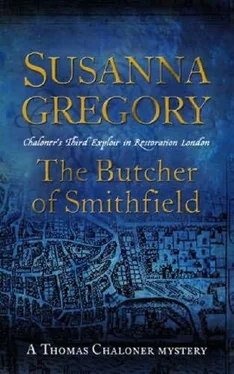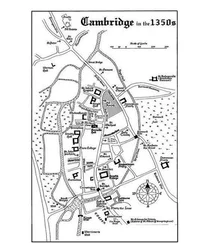Susanna Gregory - The Butcher Of Smithfield
Здесь есть возможность читать онлайн «Susanna Gregory - The Butcher Of Smithfield» весь текст электронной книги совершенно бесплатно (целиком полную версию без сокращений). В некоторых случаях можно слушать аудио, скачать через торрент в формате fb2 и присутствует краткое содержание. Год выпуска: 2010, ISBN: 2010, Издательство: Little, Brown Book Group, Жанр: Исторический детектив, на английском языке. Описание произведения, (предисловие) а так же отзывы посетителей доступны на портале библиотеки ЛибКат.
- Название:The Butcher Of Smithfield
- Автор:
- Издательство:Little, Brown Book Group
- Жанр:
- Год:2010
- ISBN:9780748124541
- Рейтинг книги:5 / 5. Голосов: 1
-
Избранное:Добавить в избранное
- Отзывы:
-
Ваша оценка:
- 100
- 1
- 2
- 3
- 4
- 5
The Butcher Of Smithfield: краткое содержание, описание и аннотация
Предлагаем к чтению аннотацию, описание, краткое содержание или предисловие (зависит от того, что написал сам автор книги «The Butcher Of Smithfield»). Если вы не нашли необходимую информацию о книге — напишите в комментариях, мы постараемся отыскать её.
The Butcher Of Smithfield — читать онлайн бесплатно полную книгу (весь текст) целиком
Ниже представлен текст книги, разбитый по страницам. Система сохранения места последней прочитанной страницы, позволяет с удобством читать онлайн бесплатно книгу «The Butcher Of Smithfield», без необходимости каждый раз заново искать на чём Вы остановились. Поставьте закладку, и сможете в любой момент перейти на страницу, на которой закончили чтение.
Интервал:
Закладка:
‘I see,’ drawled the yellow-wigged man, exchanging a smirk with his dashing companion. ‘So, you admit you have no control over what is published in your newsbooks, do you? That explains a good deal — such as why they contain all manner of dross about the Swiss ambassador’s dinner in Paris, but nothing about the dealings of our own government.’
The coffee-boy grinned conspiratorially, and nudged Chaloner with his elbow. ‘They have been at it all morning,’ he whispered.
‘At what?’
‘Squabbling. L’Estrange edits the newsbooks — although they hold little to interest the educated man, except their lists of recently stolen horses; the rest is given over to L’Estrange’s tirades against phanatiques. The fat fellow with the yellow wig is Henry Muddiman.’
‘Who is Muddiman?’ asked Chaloner, aware, even as he spoke, that this was a question which exposed him as an outsider. Unfortunately, it was true. His postings to spy overseas, first for Cromwell and then for the King, meant the time he had spent in London was limited to a few weeks. He was a stranger in his own land, which was sometimes a serious impediment to his work. He knew he could rectify the situation — but only if his masters would stop sending him abroad.
‘Muddiman was L’Estrange’s predecessor at the newsbooks,’ explained the coffee-boy, looking at him askance. ‘Everyone knows that.’
‘Oh, yes,’ said Chaloner, frowning as vague memories of the man’s name and the nature of his business began to surface. Muddiman had produced newsbooks during the Commonwealth, and the King had kept him on after the Restoration. ‘I remember now.’
‘Muddiman was ousted for political reasons, and the pair now hate each other with a passion. These days, Muddiman produces news letters , which are different to news books , as you will know.’ The lad shot Chaloner another odd glance, not sure if he was assuming too much.
‘Newsbooks are printed,’ supplied Chaloner, to show he was not totally clueless. ‘Newsletters are handwritten. Printed material is subject to government censorship; handwritten material is not.’
‘Precisely — which means the news letters are a lot more interesting to read. Of course, Muddiman’s epistles are expensive — more than five pounds a year! — but they contain real information for the discerning gentleman.’
From the way he spoke, Chaloner surmised that the boy considered himself familiar with ‘real information’. He was probably right: coffee houses were hubs of news and gossip, and working in one doubtless meant the youth was one of the best informed people in the city. Chaloner edged deeper into the shadows when L’Estrange drew his sword.
‘L’Estrange should learn to control his temper,’ the boy went on, his tone disapproving. ‘One does not debate with weapons , not at the Rainbow. We deplore that sort of loutishness, which is why he has been asked to leave. And Muddiman should not have followed him outside, either, because now L’Estrange will try to skewer him. You just watch and see if I am right.’
‘You speak as much rubbish as you print,’ said Muddiman, addressing his rival disdainfully. Chaloner was not sure he would have adopted such an attitude towards a man with a drawn sword, especially one who was clearly longing to put it to use. ‘You are nothing but wind.’
‘You insolent-’ L’Estrange’s wild lunge was blocked by Muddiman’s companion, and their two blades slid up each other in a squeal of protesting metal. The Rainbow’s patrons had seen what was happening through the windows, and friends hurried out to separate the combatants.
The coffee-boy tutted. ‘There is not enough room in London for two greedy, ambitious newsmongers. One of them will be dead before the year is out, you mark my words.’
Bells were ringing all over the city, from the great bass toll of St Paul’s Cathedral to the musical jangle of St Clement Danes, as Chaloner resumed his walk to White Hall. He threaded his way through the inevitable congestion at Temple Bar — the narrow gate that divided Fleet Street from The Strand — and headed for Charing Cross. Carriages with prancing horses ferried courtiers and officials between state duties and their fine residences, although judging from the dissipated appearance of some passengers, the duties had been more closely allied to a night of debauchery than to papers and committees.
Chaloner turned south along King Street, and entered the palace by the main gate. The porter was reading a leaflet that condemned the immoral activities that took place in and around Smithfield. However, seeing the rapt gleam in the man’s eye, Chaloner suspected the lurid descriptions of the various vices on offer would do more to encourage the fellow to visit the area than to arouse any feelings of righteous distaste. Indeed, having scanned a few of the phrases on the back, Chaloner was tempted to go himself.
Once the porter had waved him through the gate, Chaloner’s first inclination was to hunt out Maylord. The musician’s letter had bothered him, and he wanted to know what had prompted the old man to pen such an urgent-sounding missive. But White Hall thrived on gossip, and the Earl of Clarendon would not be pleased to hear from some tattling official that his spy had finally returned home and had not made him his first port of call. So, as duty had to come before meeting old friends, Chaloner made his way to the Stone Gallery.
The Stone Gallery was a long corridor at the heart of White Hall. Its floor comprised sandstone slabs, like a cloister, and its arched windows further enhanced its monastic ambience. Its occupants put paid to any illusion of monkish virtue, though. The room rang with coarse laughter, because someone was telling an improbably lewd tale about the Duke of Buckingham’s latest conquest. Some nobles wandered about in night-gowns and bed-caps, affecting exaggerated yawns to let everyone know they had been out carousing the night before. Others were dressed, but their clothes were so laden with ruffles, lace and pleats that even the more temperate of them looked debauched.
Chaloner walked the length of the chamber looking for his Earl, nodding to the occasional acquaintance, but the Lord Chancellor was not among the chattering throng, so he went to his offices instead. These comprised a suite of rooms overlooking the elegantly manicured Privy Garden. In a small, windowless room that was more cupboard than chamber sat the Earl’s secretary, John Bulteel, copying figures of expenditure into a ledger. Bulteel was a timid, unhealthy-looking clerk who rarely spoke above a whisper and who always seemed on the verge of exhaustion. He smiled when he saw Chaloner, revealing brown, crooked teeth that probably gave him a lot of trouble.
‘The Earl is not here, Heyden,’ he said. ‘It is Sunday.’
Thomas Heyden was Chaloner’s favourite alias, and one he always used at Court. Because his uncle had been one of the men who had signed the first King Charles’s death warrant, Chaloner was a name best kept quiet until the frenzy of hatred against the regicides had faded. ‘Is he at church, then?’ he asked. ‘Should I return tomorrow?’
‘No, he will certainly want to see you today. He had your letter telling him you would be home before the end of the month, and said it would not be a moment too soon. He did not expect the Queen’s business to take quite so long, and is not very pleased about it, to be frank.’
‘He told me to go,’ objected Chaloner. ‘I wanted to stay in London.’
‘I know that, but he resents the fact that you were not here when he needed you.’ Bulteel raised his hand when the spy started to protest again. ‘It is unfair, and I am not saying he is right — I am just warning you that you may face a cool reception when you meet. Do you remember where he lives? In the building called Worcester House on The Strand. You cannot miss it — it is a great Tudor monstrosity with some part that is always falling down.’
Читать дальшеИнтервал:
Закладка:
Похожие книги на «The Butcher Of Smithfield»
Представляем Вашему вниманию похожие книги на «The Butcher Of Smithfield» списком для выбора. Мы отобрали схожую по названию и смыслу литературу в надежде предоставить читателям больше вариантов отыскать новые, интересные, ещё непрочитанные произведения.
Обсуждение, отзывы о книге «The Butcher Of Smithfield» и просто собственные мнения читателей. Оставьте ваши комментарии, напишите, что Вы думаете о произведении, его смысле или главных героях. Укажите что конкретно понравилось, а что нет, и почему Вы так считаете.












